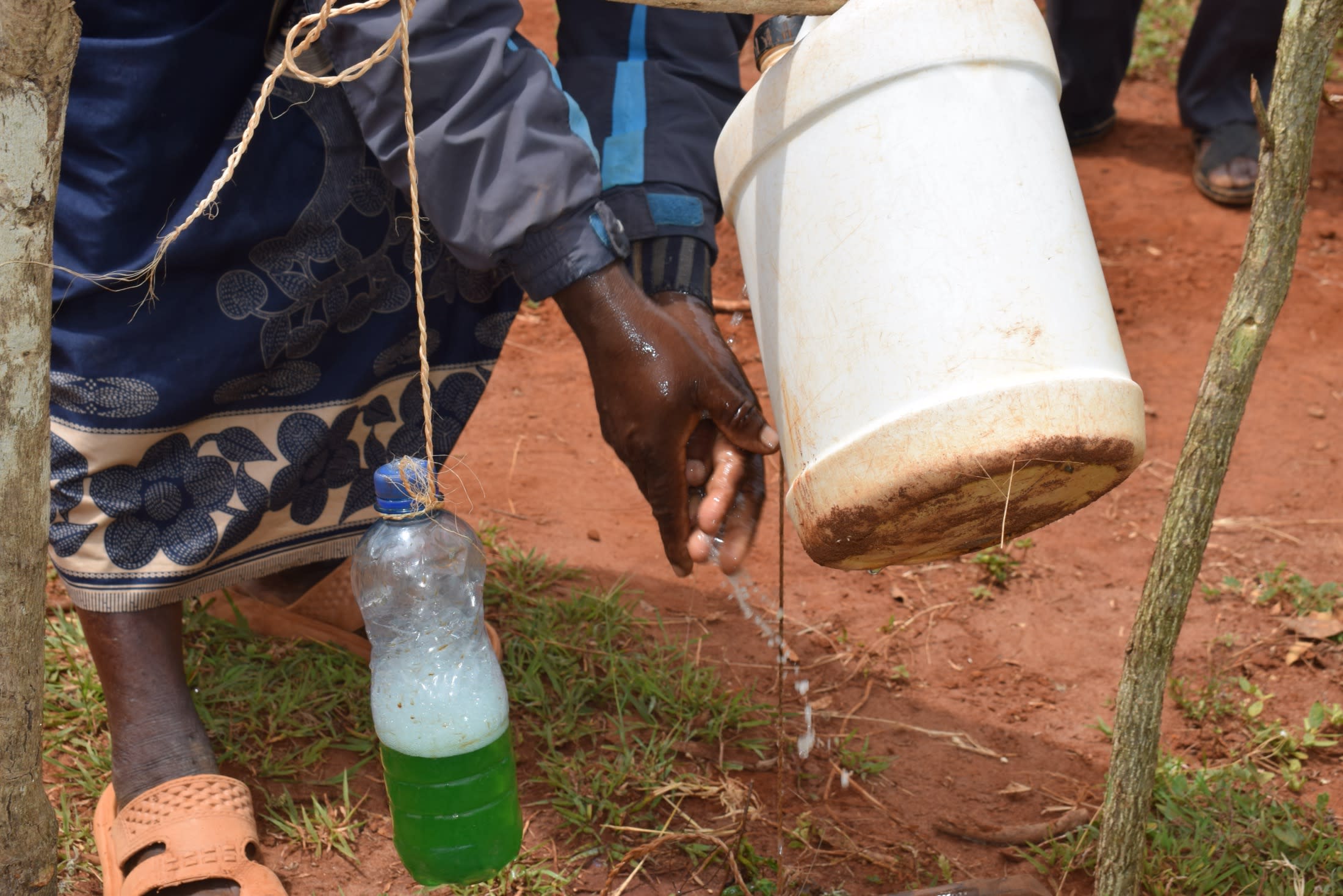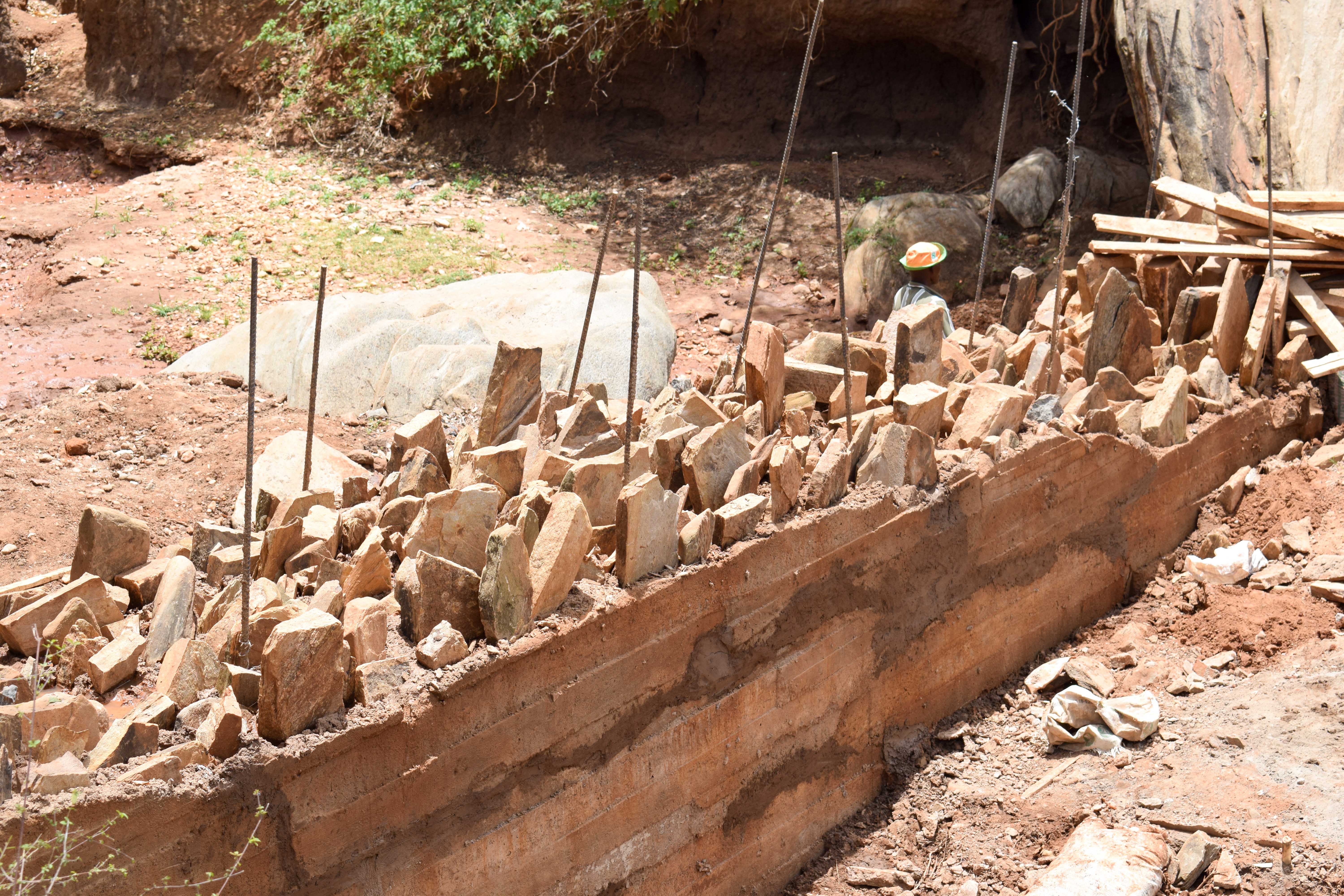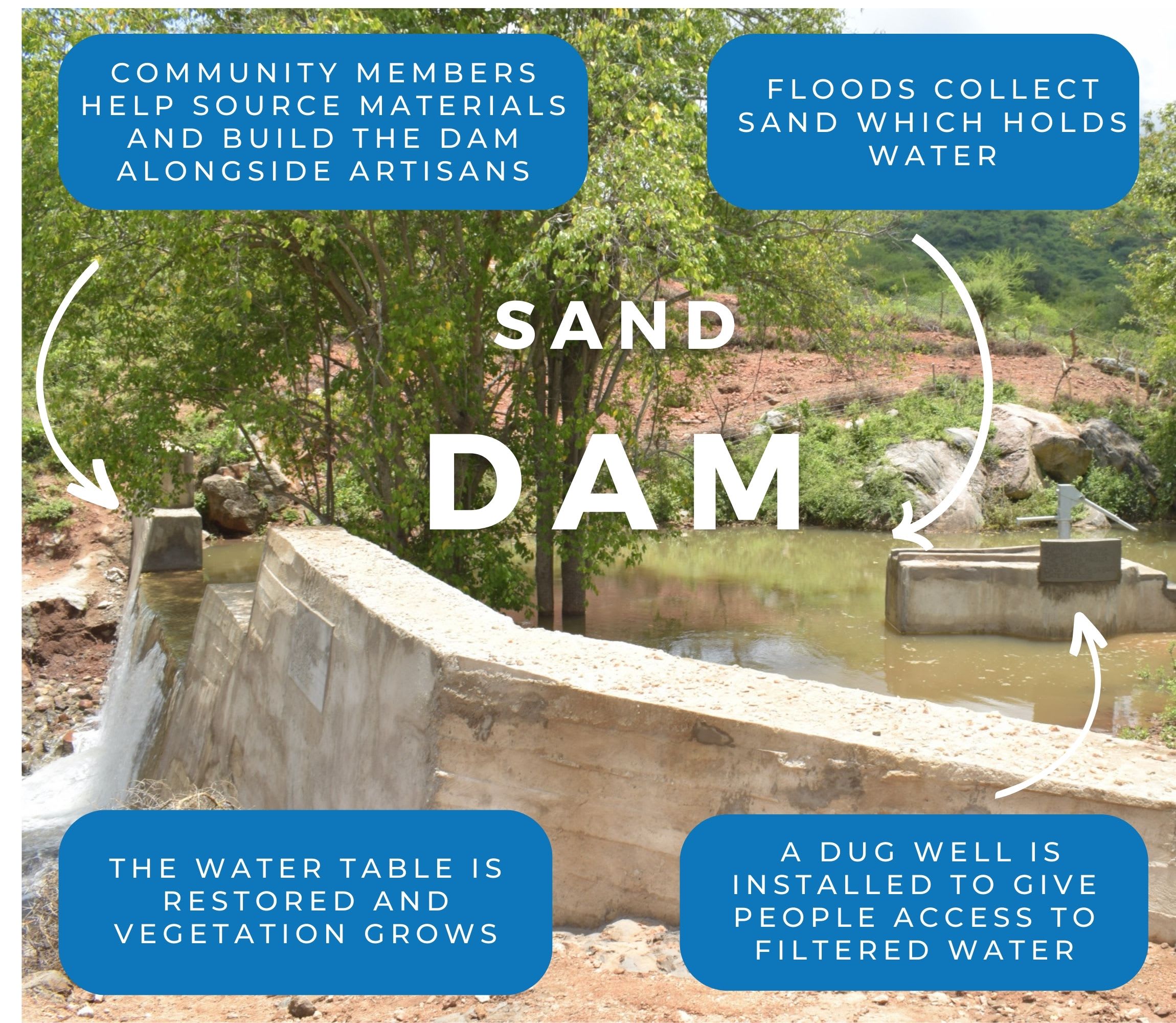Project Updates
May, 2020: COVID-19 Prevention Training Update at Mbuuni Community
Our teams are working on the frontlines of the COVID-19 pandemic. Join us in our fight against the virus while maintaining access to clean, reliable water.
We are carrying out awareness and prevention trainings on the virus in every community we serve. Very often, our teams are the first (and only) to bring news and information of the virus to rural communities like Mbuuni, Kenya.
During our training, we met Janet Mutuku, a 44-year-old teacher who lives in the community.

Janet Mutuku
She shared with us the challenges she faces during the COVID-19 pandemic. She is not working right now since the schools are closed across Kenya. That has made her life more difficult. However, the set of sand dams and hand-dug wells that her self-help group constructed over the past few years is something Janet can rely on.
“Having a well and sand dam project at this time has been a great blessing and we are very grateful for the support granted by The Water Project. Times are hard and having a reliable source of water is very advantageous," she said.

Fetching water from one of the Mbuuni wells, before COVID-19 pandemic.
We trained community members on the symptoms, transmission routes, and prevention of COVID-19.
Due to public gathering concerns, we worked with trusted community leaders to gather a select group of community members who would then relay the information learned to the rest of their family and friends.
We covered essential hygiene lessons:
- Demonstrations on how to build a simple handwashing station
- Proper handwashing technique
- The importance of using soap and clean water for handwashing
- Cleaning and disinfecting commonly touched surfaces including at the water point.
We covered COVID-19-specific guidance in line with national and international standards:
- Information on the symptoms and transmission routes of COVID-19
- What social distancing is and how to practice it
- How to cough into an elbow
- Alternative ways to greet people without handshakes, fist bumps, etc.
- How to make and properly wear a facemask.
During training, we installed a new handwashing station with soap near the community’s water point.

Handwashing station
"We are expected to wash our hands frequently and this has been possible because our projects have been providing an abundant supply of water,” Janet said.
Due to the rampant spread of misinformation about COVID-19, we also dedicated time to a question and answer session to help debunk rumors about the disease and provide extra information where needed.
Water access, sanitation, and hygiene are at the crux of disease prevention. You can directly support our work on the frontlines of COVID-19 prevention in all of the communities we serve while maintaining their access to safe, clean, and reliable water.

October, 2019: Giving Update: Mbuuni Community D
A year ago, your generous donation helped Mbuuni Community in Kenya access clean water.
There’s an incredible community of monthly donors who have come alongside you in supporting clean water in Mbuuni Community. Month after month, their giving supports ongoing sustainability programs that help this community maintain access to safe, reliable water. Read more…

June, 2018: Mbuuni Community Sand Dam Complete
Mbuuni Community, Kenya now has a new source of water thanks to your donation. A new dam was constructed on the riverbed, which will build up sand to raise the water table and naturally filter water. Community members also attended hygiene and sanitation training, and plan to share what they learned with their families and neighbors.
New Knowledge
The first hygiene and sanitation training done for this area was in March 2017. The training sessions held after the first are intended to cover weaknesses we notice during household visits. After a follow-up conducted in July 2017, there was a clear need for a review because very little had been achieved by the group members.

Reviewing the group’s progress in establishing good sanitation facilities at home.
Training was in the homestead of Gideon Kiilu and attended by 210 group members over the course of a few days. It was very sunny during training, so everyone kept shifting their chairs around to be in the shade.
We informed group members of different ways to treat water. They were very curious about learning the pros and cons of each method.
As for weaknesses, we realized the majority of latrines had open pits that allowed odors to escape and flies to enter. For new content, we taught group members how to make their own soap. Many members had already been mixing their own soap but admitted that after a few days it would spoil and have to be thrown away.
This session was particularly interesting for group members who wanted to fix their process and produce good soup for sale.

"According to how group members expressed interest in the training, I think it will change our lives," 70-year-old Gideon Kiilu said.
"For instance, on the issue of diseases, we have learned how we can prevent waterborne diseases. That knowledge will help us. We have also learned about making soap, which is a very important activity. It will help us change our hygiene standards and increase incomes."
Sand Dam
The community members collected all of the local materials like rocks and sand that were required for successful completion of the dam. They also provided unskilled labor to support our artisans. The collection of the raw construction materials takes longer than the actual construction. For a super large sand dam, materials collection could take up to four months.

This group really took advantage of its large membership to make a big impact this year. Not only did they finish this particular sand dam in a timely manner, but they split people up to work on another dam at the same time.

The bags of cement delivered for sand dam construction.
Siting and technical designs were drawn and presented to the Water Resources Management Authority (WRMA) and a survey sent to the National Environment Management Authority (NEMA) for approval before construction started. Once approved, we established firm bedrock at the base of the sand dam wall. In the absence of good bedrock, excavation is done up to a depth at which the technical team is satisfied that the ground is firm enough to stop seepage.

Stones, iron rods, and cement are used to build the wall.
Then mortar (a mixture of sand, cement, and water) is mixed and heaped into the foundation. Rocks are heaped into the mortar once there is enough to hold. Barbed wire and twisted bar are used to reinforce the mixture. Once the foundation is complete, a skeleton of timber is built to hold the sludge and rocks up above ground level. The process is then repeated until a sufficient height, width and length are built up. The vertical timber beams are dismantled and the dam is left to cure.

As soon as it rains, the dam will begin to build up sand and store water. With this water, the surrounding landscape will become lush and fertile.
However, it could take up to three years of rain (Because sometimes it only rains once a year!) for this sand dam to reach maximum capacity. It is 49.8 meters long and 5.3 meters high and took 719 bags of cement to build.

This dam isn't leaking! The water is allowed to flow so that sand will build up quickly behind the dam.
Sand dam construction was undertaken simultaneously with the construction of a hand-dug well which gives community members a safe method of drawing water. As the sand dam matures and stores more sand, a huge supply of water will be available for drinking from the adjacent hand-dug well.
To see that hand-dug well, click here.
April, 2018: Mbuuni Community Sand Dam Underway
A severe clean water shortage still affects hundred of families living in Mbuuni Community. Families are having to walk long distances to find clean water, wasting hours of time and tons of energy. Thanks to your generosity, we’re working to install a clean water point nearby and much more.
Get to know your community through the introduction and pictures we’ve posted, and read about this water, sanitation and hygiene project. We look forward to reaching out with more good news!


 Sand Dam
Sand Dam
 Rehabilitation Project
Rehabilitation Project































